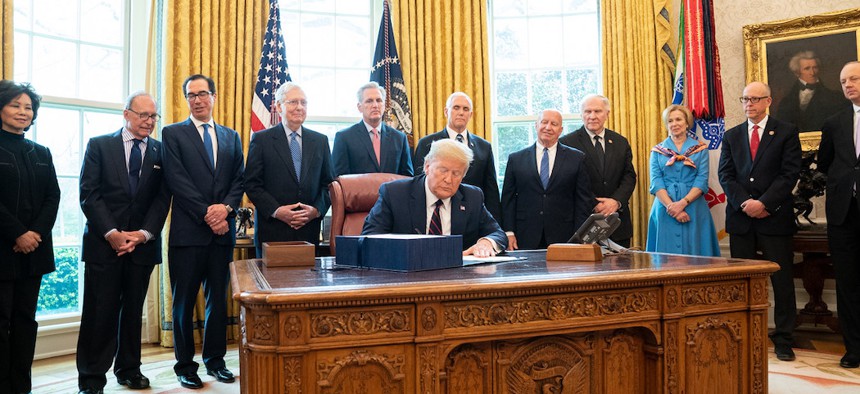Coronavirus
What’s in the federal coronavirus law for nonprofits?
Loans and a new charitable giving incentive are part of the stimulus package.

President Trump signing the CARES Act on March 27th. Official White House Photo by D.Myles Cullen
President Donald Trump signed a $2 trillion stimulus package in response to the growing COVID-19 pandemic this past Friday. And nonprofit organizations stand to benefit from many of its provisions, which include emergency loans and a new charitable giving incentive. Here are some of the main programs and initiatives that are included:
Loans
There are three loan programs that nonprofits are eligible for in the Coronavirus Aid, Relief, and Economic Security Act.
The first is the Paycheck Protection Program, which will provide emergency loans of up to $10 million for charitable nonprofits and small businesses with 500 or fewer employees, which can be used to cover the cost of payroll, health and retirement benefits, facilities and debt service. And if the recipient maintains their staffing level for eight weeks, the organization will have its loans entirely or partially forgiven. This essentially turns the loan into a grant. This program does not have a provision excluding nonprofits eligible for Medicaid payments from participating, which was in a previous version of the bill.
The law also expands and removes creditworthiness requirements for the U.S. Small Business Administration’s Economic Injury Disaster Loans. Nonprofits participating in the program will be able to get checks of $10,000 within three days. However, they cannot receive loans from both this program and the Paycheck Protection Program.
Larger nonprofits with between 500 and 10,000 employees will be able to apply for other industry stabilization loans, though these aren’t eligible for loan forgiveness. Nonprofits accessing these loans also must retain at least 90% of their staff with full compensation and benefits until the end of September. But interest on these loans would be capped at 2%, and no interest or repayments would be accrued during the first six months.
Charitable giving
People normally only qualify for charitable deductions if they itemize their taxes. The recently passed coronavirus law now allows people to deduct up to $300 on their charitable donations made during this year – whether they itemize or not. It also lifts the cap on charitable contributions for people who itemize for individuals and raises the annual limit for corporations.
Payroll tax credit
Organizations may be eligible for a refundable payroll tax credit of up to $5,000 for each of its employees. They must have seen at least half of their revenue drop in the first quarter of 2020 compared with the first quarter of 2019, and nonprofits receiving loans through the Paycheck Protection Program won’t be able to take advantage of this. The law also allows employers to defer paying their share of payroll taxes, though they will have to make up those payments for the next two years.
Paid sick and family leave
The law lowers the amount that employers have to pay for paid sick and family leave.
NEXT STORY: Leader to Leader: Phoebe Boyer
